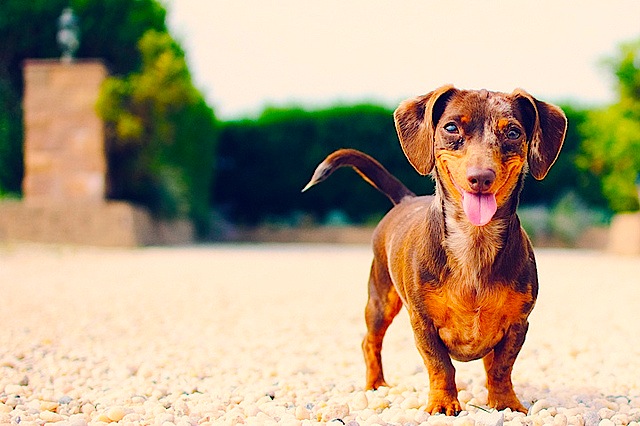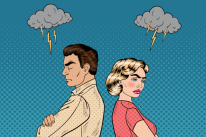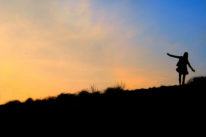
“If you learn from a loss you have not lost.” ~Austin O’Malley
Every experience, including every loss, has something to teach us even when we are not up for a lesson.
Losing one of my pets has been a chance for me to reflect on the value of the present, and has strengthened my commitment to engaging in each moment and not letting my worries and anticipation erode the possibilities of the now.
In December, my fourteen-year-old golden retriever passed away. Ripley was an incredible companion who saw me through several jobs, moved with me five times, and outlasted my longest boyfriend by over ten years.
If I was sick, she would curl up on next to me and ask for nothing until I felt better. If I was sad, she would push her head into my hand and offer as many dog kisses as I could stand. If I was just being lazy, she would bark at me until I got off the couch for a walk or a fierce game of tug.
I was fortunate that she was a happy, vibrant dog up until the last few days of her life when she simply slowed down and passed away peacefully.
The decision to let her go wasn’t easy but it was uncomplicated, and I felt a sense of clarity throughout the process of saying goodbye.
What I didn’t anticipate was the depth of loss I have experienced since she passed. And I certainly didn’t know that my other dog, Keaton, would help me so much through the loss and guide me back onto my path.
Ripley died a couple weeks before the holidays, which meant the weeks following were hectic and spent with people closest to me who understood the significance of my loss.
After the holidays, Ripley’s absence started to sink in at the base level of loss that shows itself in the shift of your daily routines and spotlights the silly, simple ways that someone or something becomes ingrained in your life.
It’s then I realized that as much as letting her go hurt, it wasn’t her actual passing that was the most difficult. It was going to be the gap created by her absence that would hurt and challenge me the most.
The pain of saying goodbye was nothing compared to the poignant ache that was created once she was gone.
Keaton is a tall, goofy, five-year-old golden retriever, and from the day I brought him home as a puppy, he pledged his allegiance to Ripley with the dedication of a novice cult member.
When she passed, he spent the first week searching the house and whining in what I projected onto him as sadness; so there was some sort of transition happening that he could not have anticipated.
The week before she died was filled with lasts—the last time they ate together, the last time they wrestled playfully growling fake growls, and the last time they banished the squirrels from the yard like a superhero and her faithful sidekick.
And all the time he was sharing those experiences with her, Keaton wasn’t wondering when she would leave or what it would be like without her. Whatever he experienced was free, unmitigated by what might happen and unscathed by concerns if it was going to ever happen again.
He reminded me of one of my favorite poems, The Peace of Wild Things, by Wendell Barry. In particular, one line reads, “I come into the peace of wild things, who do not tax their lives with forethought of grief.”
Keaton and I are going through the loss in our own canine/human ways, but he never wasted time worrying about the possibilities, the future, the maybes and what-ifs that can rob us from a full experience.
Whether those experiences are good, bad, joyful, funny, challenging, exhilarating, or exhausting—they are the beautiful arenas in which we exist, triumphing and screwing up just the same. Keaton’s moments with Ripley weren’t perfect because the squirrel was caught (they never caught one); they were perfect because they happened.
How often do we step ahead of the moment and step toward concern, negativity, and anxiety? How easily are we drawn away by our thoughts of what might happen next? How hard is it, once we’ve taken that step away from the moment, to step back into the present?
We are all on a path toward greater mindfulness (we’re all reading Tiny Buddha, right?) and the universe is always offering simple reminders and lessons that might lead us to profound change.
I was crushed when Ripley passed, and was in no mood to look for lessons or even accept them. Perhaps thinking about Keaton’s experience with Ripley and then without her gave me the perspective from which I could accept the lesson being offered.
My dogs have been great teachers, reminding me that disarming the anxiety of what may be, and the pain of what has been lost, frees me up to more fully engage in the present and challenge myself to bask in the joy of each moment. And that each of those experiences is invaluable.
There will never be another moment just like that, no matter how good or bad, and that makes it precious.
Every time I would let the dogs out, Ripley would stand at the edge of the deck, bark confidently, and then wait to see which neighborhood dogs would respond. All the while, Keaton never barked. The day after she passed, I let Keaton out and as I turned to go back into the house, I heard a deep, unfamiliar bark.
I turned to see Keaton standing on the edge of the deck, looking across the yard with his ears up and tail wagging.
Ripley was gone and Keaton was stepping up and into the moment. In that simple bark, he reminded me the best way to honor what has passed is to step into the present fully with my ears up and tail wagging.
Photo by thezartorialist.com
About Carol Van Der Karr
Carol Van Der Karr and her critters live in central New York. She works at a fantastic college and enjoys nature, pretending she can do home improvements on her own, and working on her path to a higher level of mindfulness and joy.













 Though I run this site, it is not mine. It's ours. It's not about me. It's about us. Your stories and your wisdom are just as meaningful as mine.
Though I run this site, it is not mine. It's ours. It's not about me. It's about us. Your stories and your wisdom are just as meaningful as mine. 